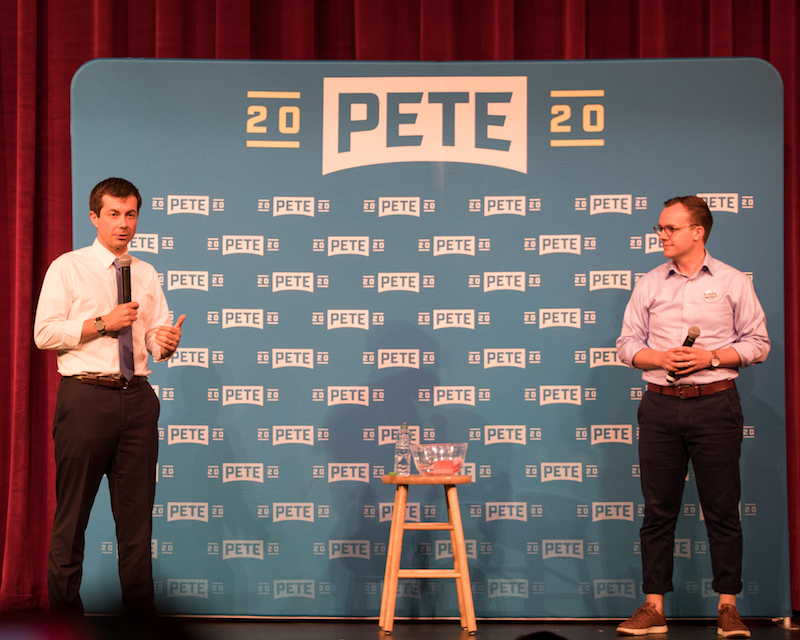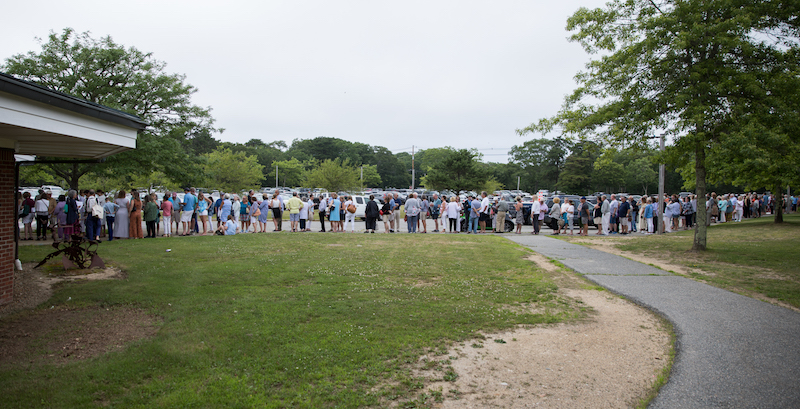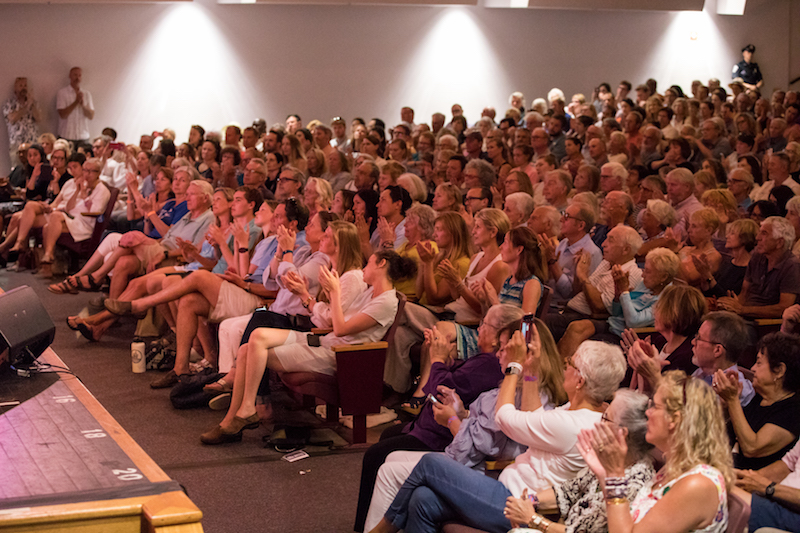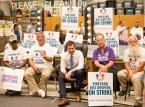Martha’s Vineyard had a mayor on Saturday. His name was Pete Buttigieg.
The Democratic presidential candidate and mayor of South Bend, Ind., came to the Vineyard as part of a campaign fundraising tour through the Northeast, hosting a sold-out event at the regional high school’s performing arts center. A crowd of nearly 800 Islanders, all of whom donated a minimum of $25 to the Buttigieg campaign, watched as the 37-year-old presidential hopeful from middle America stumped his message to a small Island seven miles off the coast of Cape Cod.
“Freedom, security, democracy,” Mr. Buttigieg said. “In themselves, those are words nobody can be against. But when you take them seriously . . . they take you to a very progressive place. So, to me, that’s our message: freedom; security; and democracy.”
An hour before Mr. Buttigieg got on stage, a line of about 100 Islanders had already gathered at the doors to the high school. The crowd bristled with excitement around a candidate that in 2014 the Washington Post profiled as the “most interesting small town mayor you’ve never heard of.” Five years later, the Harvard-grad, ex-Naval reserve officer and former Rhodes Scholar had the best second-quarter fundraising effort of any candidate in the crowded 2020 Democratic field.
“I think he’s my favorite right now,” said Rufus Peebles, an active Island Democrat while waiting in line. “And we were in Leverett House,” he added, referencing the Harvard connection. Of course, Mr. Peebles, who graduated in 1961, was quick to admit that Mr. Buttigieg was merely a freshman when he was a senior . . . citizen.
The age difference didn’t seem to matter for the generally gray-haired Vineyard crowd — with a spattering of children and college-age kids in the audience — who roared with applause when the youthful Mr. Buttigieg made his way on stage. Twenty minutes prior, Mr. Buttigieg had met with the striking VTA drivers, expressing support for their cause as he emphasized the importance of the nationwide labor movement.
After an introduction from host Laurie David, Mr. Buttigieg began by outlining the three values around which he has centered his campaign — freedom, security, and democracy — and how he planned to reclaim those values from the conservative side. He was simple and to the point, at once a little dorky and endearing, appealing to the broad-based sentimentality of a progressive political movement without the silver-tongued approach of some of his peers or predecessors.
“We need to reach into our deepest values, and organize our politics around that,” Mr. Buttigieg said “As a Democrat, it has always bothered me that the word values itself has sometimes been talked about like it belongs to the conservative movement, like they’re the only ones that have values, which doesn’t make sense.”
He talked about how, in his view, the conservative hijacking of values like freedom and security had created limited definitions for the terms, instead stressing health care, women’s reproductive rights, and gay marriage as his essential freedoms. He talked about how security wasn’t “putting up a wall coast to coast” but working to protect the country from climate change and cyber threats. He talked about how God, economic opportunity, and service — whether volunteer service or military service — shouldn’t belong to one political party, but as options for all Americans, outlining a policy for an expansion of AmeriCorps and the Peace Corps. He concluded by saying the surest way to secure those freedoms, and the country itself, was to shore up American democracy, making pitches for overturning Citizens United and voting reform.
“I think of it all in terms of 2055,” Mr. Buttigieg said. “It’s the year, god willing, that I will reach the current age of the current president. By then, I expect my kids and grandkids to be holding my generation to account for what we did, whether we changed the course of this country before it was too late. And to be able to say we made the right choices in 2020.”
Then Mr. Buttigieg brought a special guest on the stage. He happened to have the same last name.
“He’s a good follow on Twitter, but I’m a little bit biased, because I’m in love with him,” Mr. Buttigieg said. “My husband Chasten.”
Chasten Buttigieg then read fishbowl questions from the audience to his husband, serving as a more humorous, softer-spoken foil for his business-like presidential aspirant and partner. The first, “What is your strategy to reach African Americans?” came out hot for a candidate who is polling close to the bottom among black voters and three weeks ago had a police shooting roil his hometown. Mr. Buttigieg responded by outlining a five-point plan for investing in black communities through criminal justice reform, entrepreneurship, home ownership, health and education.
“That’s how we’re going to deserve to win, with a bold approach,” he said.

In response to a question about how he would deal with Mitch McConnell, Mr. Buttigieg said there were two options.
“I think a pretty good use of Air Force One is to fly it to the home state of a senator who’s getting in the way of a broadly popular policy that we are going to advance and reminding that senator’s voters of how much daylight is between them,” Mr. Buttigieg said. “There’s one policy that’s even better, and that’s to have a nominee from the industrial Midwest with strong enough coattails that you don’t have Mitch McConnell in charge of the senate.”
Other questions were a little easier, like how he planned to get young voters to the ballot box.
“One thing you can do is put up a candidate from a new generation. So obviously I’m a fan of that,” Mr. Buttigieg said to laughs.
Between the serious fishbowl questions, Chasten interjected with a few more lighthearted questions that hearkened to the dating-app style dialogues common among millenials. He asked his husband whether he preferred beach or mountain vacations (“why not both?”); why Phish was his favorite band (“it’s the same song that’s different every time”); and their best date (“the first one”). The two performed well, Buttigieg the ever-serious politician, Chasten the schoolteacher along for the ride.
“What made you smile today?” Chasten asked.
“I’m learning that Martha’s Vineyard is very rustic,” Mr. Buttigieg said. “There were some sheep nearby. And I will never be able to not laugh at a sheep bleating. It’s just funny to me. It’s hard not to smile.”
Mr. Buttigieg went on to discuss carbon taxes and how he planned to rebate the tax to the American people, an emotional defense of late-term abortion and education (Chasten is a schoolteacher), and how he felt it was not just important to make college affordable, but to make not going to college affordable as well. He talked about religion and morality, hopeful that people of all creeds could agree on the central tenet of trying to make others better off. Where he was short on policy, he was big on ideas, and throughout most of his 45 minutes on stage he had his husband right by his side.
“Part of my own life experience is that when I started in politics, which wasn’t that long ago, the beginning of this decade, it was certain as sure as anything, at least in Indiana, you could be out, or you could be in elected office, but you couldn’t be both,” Mr. Buttigieg said. “And now, in the same decade in which that was true, now, in 2019, you’re in the room with a top-tier Democratic presidential candidate and his husband.”
That probably got the biggest applause.








Comments (6)
Comments
Comment policy »